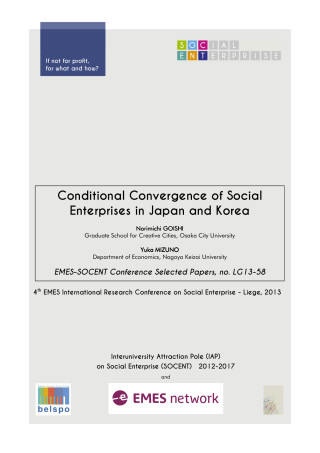Over the past two decades, Japan and Korea have rapidly deindustrialized, and the percentage of employees in manufacturing has decreased remarkably. Not only have their economies transformed, but their populations and social structures as well. Inequality has expanded, their populations have rapidly aged, irregular employment has been replacing regular employment, and nuclear families have been dissolving. Other advanced countries have faced similar changes previously since the 1970s. A concept of “social exclusion” has been widely used in this situation. Governments and civil societies have tackled these new challenges and implemented structural reforms to replace old welfare systems and social regimes. Work integration social enterprise (WISE) is an example of one of these efforts to create new jobs and provide employment services for the unemployed or disadvantaged people.
Up until the mid-1990s, the governments of Japan and Korea were reluctant to expand social expenditures. High economic growth, low unemployment rates, relatively equal market distribution justified these policies. Instead of governments, workers’ families, namely women, have provided care services to their husband, children, or elderly people in the household, and private companies have offered basic benefits to employees. After the economic crisis of the late 1990s, however, homeless populations increased sharply in Tokyo and Seoul, young people faced tough labor markets, and more and more workers lost their jobs. The welfare regimes of both countries required large reforms to deal with these challenges. Under the old regime, poor people were thought to be unable to work, and public assistance targeted mainly this group, such as the elderly, disabled, injured, and sick. After the crisis, however, even those who can work or are working are likely to be poor. Existing welfare services were not ready to provide employment services and create jobs. WISEs are recognized as one of the measures to tackle this problem.
While social enterprises have become increasingly popular, their public policy roles in Korea and Japan differ, just like the difference between US and Europe (Kerlin 2006, Nyssens 2010). The first object of this paper is to compare and contrast Japanese and Korean social enterprises. For that purpose, we classify social enterprises into two types, Social and Community Business, and WISEs.



